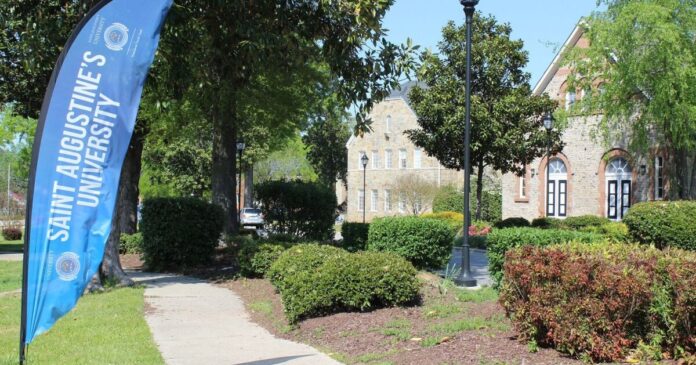Saint Augustine’s University is cutting half of its employees as it works to regain its financial footing.
The private HBCU has faced several financial challenges this year, including trouble paying its faculty, delayed student refund payments, and nearly $10 million in tax liens from the IRS. The university also lost a decade-long partnership with Wake County Public Schools, and had to switch to virtual instruction in the spring, sending most of its students home early for the semester.
In the midst of this, the university has been fighting to maintain its accreditation with the Southern Association of Colleges and Schools Commission on Colleges (SACSCOC). Saint Augustine’s has been on probation with the accrediting agency for nearly two years, after failing to meet several of its financial standards.
Last December, SASCOC’s appeals committee voted to terminate Saint Augustine’s accreditation and its membership. In February, it reaffirmed this decision after allowing SAU to present a case to stay accredited.
Both decisions were later reversed by an arbitration committee, which decided to give the university one final chance to prove its financial stability. That grace period is coming to an end, as Saint Augustine’s is set to meet with the SACSCOC board again next month.
There, the agency is set to make a final decision on the private HBCU’s accreditation.
In a press release sent Saturday, Saint Augustine’s University said the employee cuts will help stabilize the HBCU’s finances ahead of the accreditation meeting.
The university is eliminating 67 staff positions, 37 full-time faculty positions, and 32 adjunct faculty positions. It will also discontinue several academic programs. These cuts have helped reduce the university’s expenses by about $17 million, according to the press release.
Interim President Marcus Burgess said the cuts were a difficult decision, but are “crucial” for the HBCU’s long-term sustainability.
“We are committed to transforming SAU into a financially stable institution that prioritizes the success of our students and stakeholders,” Burgess said. “Our ongoing efforts to stabilize the financial condition of Saint Augustine’s University are now showing tangible results. Our community is responding positively, and we are excited about our future.”
Not all members of the Saint Augustine’s community are “responding positively” to the university’s moves to improve its financial footing.
Last week, a coalition of activists protested the university’s decision to enter a multimillion loan with a venture capital firm. The $7 million loan with Saint Augustine’s and Gothic Ventures comes with a 24% interest rate and is secured by a deed of trust on the university’s property.
Advocates worry the agreement could cost the private university its property, and allow for more gentrification in the area. Jaylon Herbin, director of federal campaigns for the Center for Responsible Lending, said the loan is predatory and puts a “crushing burden on the university’s future.”
“Saint Augustine’s University (knew) that these terms were not acceptable,” Herbin said at a press conference. “The loan as in question carries an unacceptable high interest rate at times when Saint Augustine’s University is already financially stressed — struggling with rising operating costs, declining enrollment, and reduced government funding. This loan exacerbates its physical strain.”
Saint Augustine’s University said the loan was vital to ensuring it can remain operational for the 2024-2025 school year.
The university lost a significant portion of its enrolling class between the 2022 and 2023 school years. In 2022, the HBCU had about 870 students. That decreased to only about 200 students in 2023, as the university navigated its accreditation challenges.
Universities must be accredited to receive federal financial aid like the Pell Grant. According to a 2022 report from the National Center for Education Statistics, about 78% of students at Saint Augustine’s University were awarded a Pell Grant.
Other changes Saint Augustine’s University has made in preparation for SACSCOC’s December accreditation review include updating their financial policies and procedures, developing a financial sustainability plan, and conducting four financial audits for fiscal years 2021-2024. According to the press release, the university is also “actively settling” several outstanding balances with vendors.
WUNC partners with Open Campus on higher education coverage.
